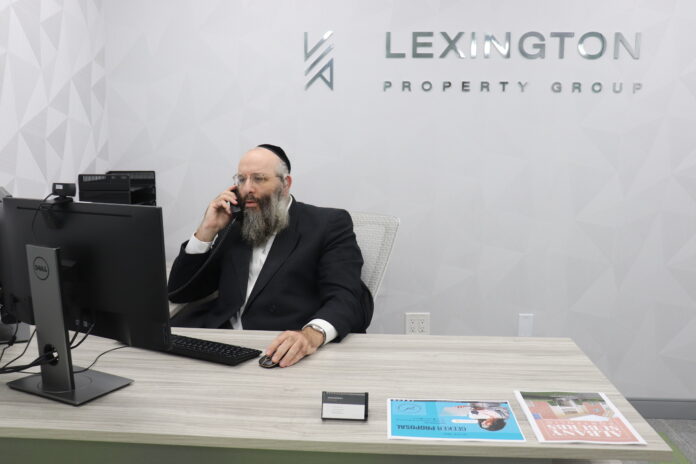Real estate businessman Jacob Eisenbach had a problem that all businesses face at some point: he had issues with his computer. While such problems are common, Jacob’s solution was anything but. In a world where we want everything done yesterday, Jacob wondered why there wasn’t a platform that offered (almost) instant IT assistance from real people. Since it didn’t exist, he went about creating it. Today, his company, Geeker.co, is, as he calls it, “the Uber of IT and software support.”
Geeker connects anyone facing an IT or software issue with a technician who can assist them in real time for a fraction of the cost of traditional IT services. While large companies certainly need their own on-site IT staffers, Geeker provides a much-needed service for solopreneurs, small business owners, or anyone seeking quick help to solve their computer problem. The site processes hundreds of help requests every month, and it’s growing steadily.
Jacob grew his real estate career from scratch. He started by managing two properties, then became a rental agent (a new concept at the time), and progressed to purchasing and rehabilitating distressed properties. Over time, he developed relationships with banks and investors; today his portfolio includes multimillion dollar properties. As for Geeker, Jacob built the company without losing focus on his real estate business. What makes the founding of Geeker unique is that Jacob is not a “techie” who always dreamed of starting a tech company. He simply saw a need and took the steps to fill it.
Business ideas are a dime a dozen, but it is rare that they are properly developed and grow into successful companies. Speaking to Jacob about his journey in the world of real estate and then the creation of Geeker, I found that each part of his story contains solid advice that others can learn from. Enjoy!
—Nesanel
I was born and raised in New Square, New York. My father was born in New Square as well, and my mother is from Israel. When I was growing up, my father worked as an administrator and fundraiser for a mosad based in Yerushalayim, and my mother was a homemaker. I am one of seven children; I have three sisters and three brothers.
“I went to Skverer mosdos through high school and beis midrash. Although I took my learning seriously, I was always the entrepreneurial type, dreaming about what I would do when I was older.
“I didn’t grow up with money. My mind was always busy, thinking of how I could earn some pocket change. For example, during bein hazmanim I did some customer service for Rockport shoes and ran a little ‘business’ renting out beepers—remember those? I sold calling cards and vending machine snacks, and I worked as a typist, typing up handwritten chiddushei Torah for sefarim. What didn’t I do? Every day, it was something else, and none of it brought in money on a big scale.
“I got married when I was 20. My wife is from the Klausenberger kehillah in Union City, and we moved there after our wedding. I was in kollel for a few years in Union City and then I became a maggid shiur in the local Klausenberger yeshivah.
“The Klausenberger Rebbe, zt”l, used to push his chasidim to buy real estate. He would say, ‘If you have money, buy a house to live in. If you don’t have money, buy two.’ There wasn’t a single yungerman in Union City who didn’t own real estate, and everyone freely shared their knowledge with each other. It didn’t conflict with our learning, as we worked on it before and after seder.
“There is a special Yid by the name of Reb Meir Weiss who has always been my role model. Reb Meir owns real estate, yet his real home is the beis midrash. He delivers several shiurim including Daf Yomi, and he always begins his day by learning in the beis midrash for several hours. That’s who I aspire to emulate. He’s a real example of Torah ugedulah b’makom echad.
“I learned about buying properties, applying for mortgages, handling tenants, and on and on. Since Union City is next to the Lincoln Tunnel, the Union City/Jersey City area was always a hot market. The opportunity was there.
“When I was in kollel, a community member was kind enough to give me two buildings to manage. I didn’t have experience, but I learned on the job. The building management work was not so extensive, so it didn’t take away from my learning. One building was 18 units and the other was 12, and they were both located around the corner from me, so I didn’t even need a car to get there. I managed them from my basement. I collected rent, deposited it, called the plumber if a toilet broke—things like that.
“Around that time I also came up with my first ‘business.’ Every year, when we prepared the ten pieces of bread to hide for bedikas chametz, it seemed like it was asking for trouble. We’d forget where we hid them and then it would take forever to find them, and of course, when we cut the bread to make the small pieces, we’d end up with crumbs all over the place. I knew this happened in many other homes, too, and I thought there had to be a better way.
“I came up with the idea to package ten pieces of bread individually and sell them as a set for bedikas chametz. Each piece was in its own small sealed package. I have a picture of tons of pieces of bread spread out all over my living room to dry out before being packaged. When I came up with the idea, people looked at it and said, ‘What is this? People are getting so lazy!’ But the sets sold well. After a few years, I sold the idea and the machines that I used to package the bread to Ner Mitzvah. They still sell the sets today.
“At one point, I came across what I thought was a good deal: a six-family building that I saw potential in. A friend loaned me $80,000 for the down payment. I gave the place a small touch-up, managed to bring in six new families and refinanced the loan. That was how I started my real estate career, with those six families.
“Today, rental agents are commonplace, but I was one of the first to do it. The concept was that I would find tenants for the building owners and charge them a month’s rent for the service. The idea really appealed to them. Finding renters was not their specialty, and they were busy enough handling the main operations of their buildings. Hiring a rental agent was an ideal situation for them.
“I rented an office space and named the business EZ Rent, like the EZ pass symbol. I would go around to landlords advertising my services. It was hard work, as these were really bad areas where people didn’t really want to live. And if people did move in, they would often regret it and break their lease.
“I started the rental agency business with a partner, Sam (Shalom Mordche) Schwartz. We’re still partners, 15 years later.
To read more, subscribe to Ami





















